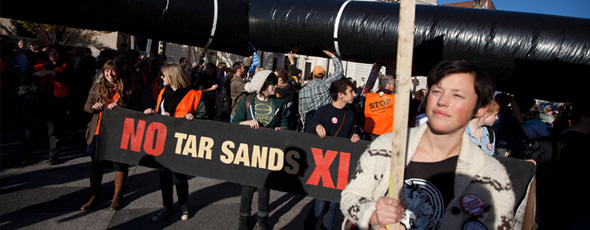
Early morning in Nacogdoches, Texas on November 19. Protesters with the Tar Sands Blockade, dressed head-to-toe in camouflage gear, build wooden platforms 50ft up in pine trees. Three people will attempt to block construction of the controversial Keystone XL pipeline today. A few miles away, four more protesters lock themselves to construction equipment. Later, 120 people rally in a small East Texas town – confronting pepper spray, lawsuits and felony charges – to demand that the Keystone XL pipeline never be built.
This pipeline is planned to run from Alberta, Canada to the Gulf Coast of Texas and will pump diluted bitumen, or tar sands, nearly 2,000 miles to Texan oil refineries. If built, an area the size of New York state will be surface-mined and completely destroyed to extract clay-like raw bitumen. This must then be heated up and diluted with liquefied natural gas and an undisclosed chemical cocktail before it can be pumped, via the pipeline, to those oil refineries. In 2010, the largest onshore oil spill in US history occurred in Michigan when tar sands gushed into the Kalamazoo river. Two years later, that spill is still not cleaned up.
Extraction of tar sands is one of the most environmentally damaging processes in the fossil fuel industry. The process is also costly in terms of carbon emissions. According to Oil Change International, our ability to keep climate change at two degrees Celsius depends on tar sands’ exploitation being kept under 3.3 million barrels a day. Current projects and approved future projects are expecting to put out between 7.1 and 9 million barrels per day. For the future of the planet, we must slow down.
In July, Tar Sands Blockade held a series of regional actions at construction sites to show the world that building had begun on the Keystone XL pipeline. August saw a series of lock-ons that shut down construction sites. Action was ramped up in September with the Winnsboro Tree Village, a fortified tree blockade which blocks the proposed path of the pipeline and includes a 100 foot wall and several tree houses 80 feet high in which protesters have been residing for over two months.
The Tar Sands Blockade has gained support from over 35 major environmental and progressive organisations. More than 40 solidarity actions were held across the continent in conjunction with the Nacogdoches tree protest, lock-on and rally, targeting banks that fund tar sands, regulators in Texas, and the Canadian Consulate in Washington, DC.
TransCanada, the company behind the Keystone XL project, has responded to the campaign by cracking down on dissent. They now pay a private security force comprised of local off-duty police officers $30 per hour to patrol the pipeline route with orders to illegally arrest anyone they see. Two journalists from the New York Times were detained for reporting on the Blockade. Green Party Presidential Candidate Jill Stein was arrested for trespassing when she successfully resupplied the Winnsboro Tree Village. In total, 42 protesters have been arrested, most of them for trespassing.
Pain compliance tactics have also been used, putting protesters’ lives in danger on several occasions. At several lockdowns police have used pepper spray to force protesters to unlock, even spraying it into cuts to cause maximum pain. On one occasion, two protesters were shot with a taser gun until they unlocked themselves. TransCanada also operated heavy machinery around the Tree Village for weeks dangerously close to support lines.
The sustained nonviolent direct action campaign in Texas has forced the Keystone XL, tar sands and climate change issues into the public consciousness, keeping the focus on those most impacted by the pipeline. Indigenous communities, local landowners, and people living next to refineries have all begun organising with the Blockade.
President Obama will make a decision about the northern segment of the pipeline early next year, but resistance has already begun in Texas. The November 19 mass action shut down construction at two sites around Nacogdoches and resulted in 11 arrests. As police tried to extract the tree-sitters, a few dozen protesters stood in the road to stop the cherry-picker from getting close enough to the trees. Immediately police started pepper-spraying the protesters, including a local 75-year-old women and a 21-year-old student. Despite these tactics, supporters across the country raised $20,000 for bail in less than 48 hours and all arrestees have been released.
By Will Wooten









